Overview
We recognize that the right HL7 integration tools are vital for achieving success in healthcare. These tools significantly enhance interoperability and improve patient care, which are essential in today’s fast-paced medical environment. Selecting tools that prioritize:
- Security
- Ease of use
- Scalability
- Compliance
is not just beneficial; it is critical for healthcare organizations aiming to effectively manage data exchange and optimize operational efficiency. What challenges is your organization facing in this area? By prioritizing the right integration solutions, we can transform these challenges into opportunities for growth and improvement. Let us guide you in making informed decisions that will elevate your healthcare services and enhance patient outcomes.
Introduction
In the rapidly evolving landscape of healthcare technology, we recognize that the integration of disparate systems has become more crucial than ever. As organizations strive to enhance patient care and operational efficiency, the demand for robust HL7 integration solutions is on the rise.
From our hybrid integration platform, designed to securely connect healthcare systems, to Mirth Connect’s open-source engine that simplifies data exchange, the options available are diverse and tailored to meet the unique challenges of the industry.
This article explores a range of leading integration tools, highlighting their features and benefits, and the pivotal role they play in fostering interoperability across healthcare environments.
As the industry moves towards a future where seamless data sharing is essential, understanding these solutions will empower organizations to make informed decisions that ultimately enhance patient outcomes and streamline operations.
Avato: Secure Hybrid Integration Platform for HL7 Connectivity
Our hybrid integration platform is expertly designed to securely link diverse medical systems, ensuring seamless data transfer through HL7 integration tools. With a robust architecture tailored for complex and regulated environments, we effectively mitigate the risks associated with legacy systems. This capability allows medical organizations to modernize their operations while adhering to stringent industry standards. Our platform’s real-time monitoring and alert features enable proactive management of connections, which is crucial in the highly regulated medical sector.
As we approach 2025, the landscape of connections is evolving rapidly, with 97% of hospitals and 88% of physician clinics in the United States adopting cloud-based solutions to enhance care quality. The IT & Telecommunications sector is projected to maintain the largest market share at 31.21% throughout the forecast period, underscoring the growing importance of unification solutions in medical services. We stand at the forefront of this transformation, driven by a commitment to architecting technology foundations that empower rich, connected customer experiences. The name ‘Avato’ derives from the Hungarian term for ‘dedication,’ symbolizing our promise to simplify complex connection projects while delivering results within intended time frames and budget constraints.
The advantages of our hybrid connection platform extend beyond mere connectivity; it enhances operational capabilities and reduces costs, making it an indispensable asset for medical organizations. For instance, a client from BC Provincial Health Services Authority remarked, ‘Avato’s platform has optimized our information exchange processes, significantly enhancing patient outcomes and operational efficiency.’ Expert perspectives highlight the critical role of HL7 integration tools as secure unification solutions in medical systems, particularly as the demand for improved information potential continues to grow in 2025. The global information unification market is driven by this demand, further emphasizing the significance of our solutions in addressing the challenges faced by medical institutions.

Mirth Connect: Open-Source HL7 Integration Engine
We recognize Mirth Connect as a leading open-source solution among HL7 integration tools that empowers medical organizations to share information seamlessly and effectively. We provide the flexibility necessary to meet diverse connection requirements by supporting a variety of messaging formats, including HL7 integration tools, FHIR, and DICOM. Our platform features an intuitive user interface that streamlines the setup and oversight of information flows, significantly reducing the challenges typically associated with medical systems.
In 2025, we continue to demonstrate our value, as healthcare organizations increasingly adopt HL7 integration tools, including Mirth Connect, for information exchange. Our community-driven development model fosters ongoing enhancements and robust support, ensuring that users benefit from the latest features and improvements. Notably, the implementation of HL7 integration tools like Mirth Connect has automated essential processes, such as billing submissions with laboratories, showcasing our efficiency in optimizing operations while ensuring 24/7 availability for critical connections.
A recent case study highlights NextGen Healthcare’s launch of Mirth Cloud Connect, a cloud-based interoperability solution designed to address the clinical information exchange challenges faced by multi-facility hospital systems. This initiative utilizes HL7 integration tools along with the existing Mirth Connect connection engine, providing a managed service that simplifies connectivity and enhances patient information flow. By providing a unified interface for each message type, Mirth Cloud Connect reduces both time and costs for users, ultimately improving medical outcomes through enhanced data exchange and coordination. As stated by NextGen Healthcare, “This change is intended to create a more secure and reliable platform while enabling greater investment in innovation and compliance with evolving regulations like HIPAA and ONC certification.”
As organizations consider the implications of transitioning to a paid model for connectivity capabilities, it is crucial to evaluate how HL7 integration tools, including Mirth Connect, can continue to serve as a reliable, open-source solution that supports evolving needs in the healthcare landscape. For banking IT managers aiming to enhance their integration strategies, we present Mirth Connect as a compelling option worth considering.
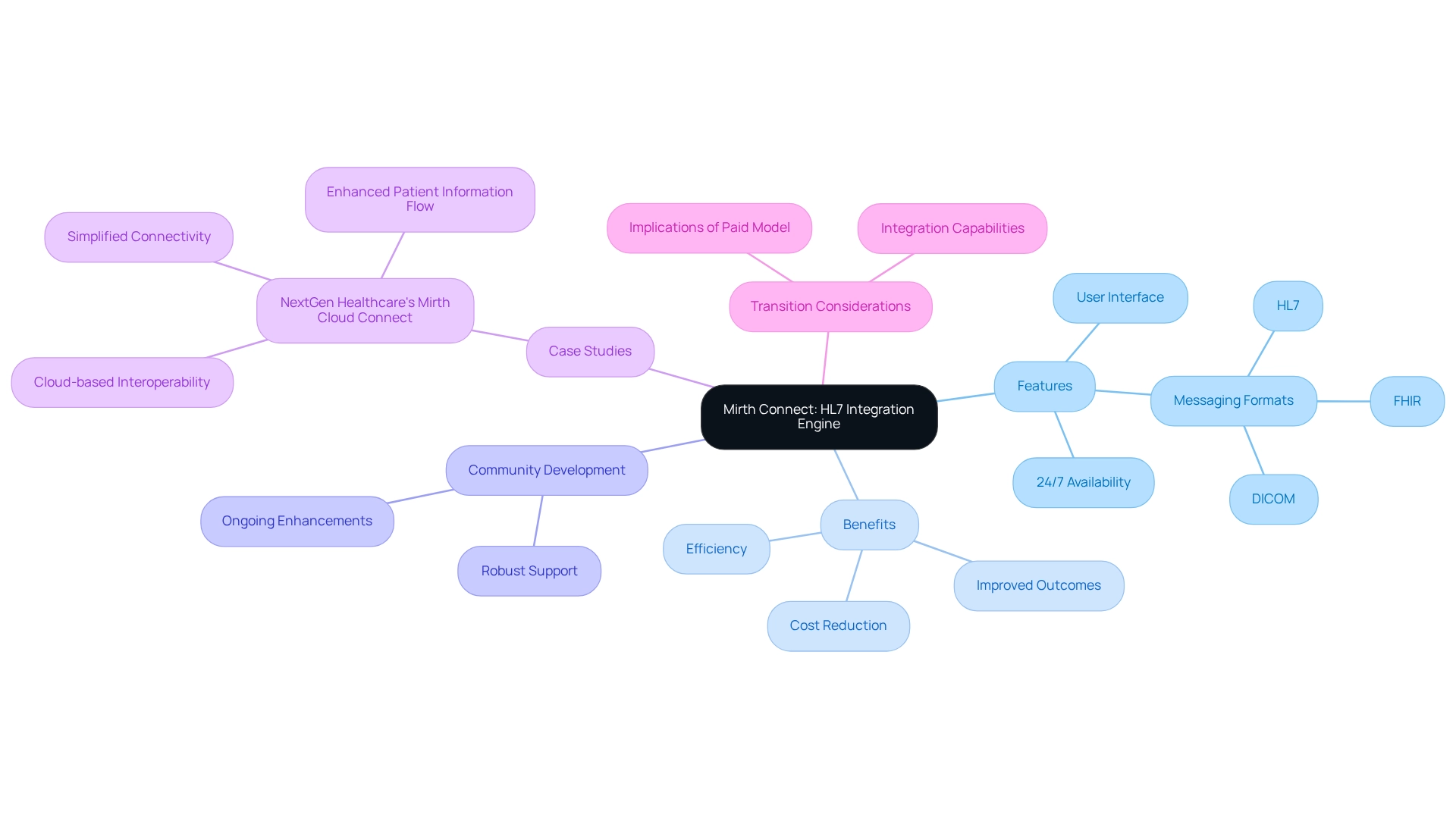
Intersystems HealthShare: Comprehensive Interoperability Solution
Intersystems HealthShare is not just a platform; it is a robust interoperability solution that seamlessly connects health information from diverse sources, enabling comprehensive patient care. By endorsing HL7 standards, we provide essential HL7 integration tools that facilitate information aggregation, normalization, and analytics—elements that are vital for effective medical service delivery. Our ability to connect with current electronic health records (EHRs) and other systems in real-time significantly enhances clinical workflows, leading to improved patient outcomes.
In this evolving landscape, our innovative hybrid connection platform elevates HealthShare by offering smooth and secure data connectivity, empowering medical organizations to future-proof their operations. Our commitment to designing technological infrastructures allows enterprises to access segregated resources, thereby enhancing the overall efficiency of interoperability solutions.
Focusing on security and compliance, we establish HealthShare as a reliable option for medical organizations navigating complex regulatory environments. With the interoperability solutions market in the medical field projected to expand rapidly—bolstered by government initiatives like the UK’s £60 million allocation to enhance life sciences manufacturing—HealthShare, supported by Avato’s unification capabilities, is well-equipped to meet these evolving demands. Notably, interoperability solutions facilitate the transfer of information between systems, promoting seamless sharing across organizations with patient approval, which correlates with positive patient care outcomes.
As the market for interoperability solutions is anticipated to grow significantly, Intersystems HealthShare, in conjunction with Avato’s cutting-edge unification solutions, is poised to capture a substantial share, solidifying our position as a leader in medical unification. Our platform not only aids in adhering to HL7 standards but also enhances patient care through effective information unification, making it an invaluable resource for medical providers striving to optimize their operations and patient services using HL7 integration tools.
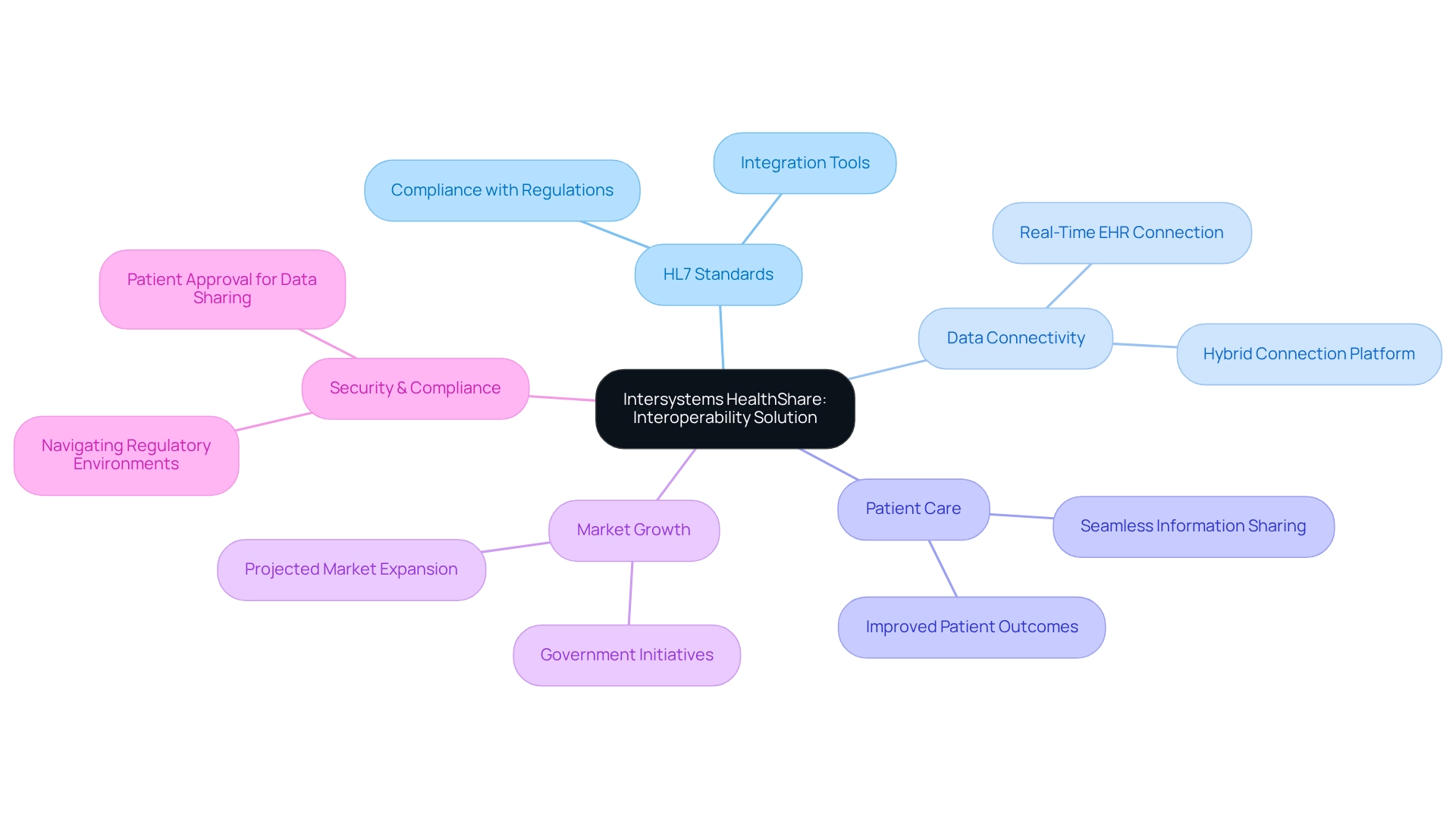
Redox: Modern Integration Platform for Healthcare Applications
We present the hybrid connectivity platform as a state-of-the-art solution that simplifies the connection of medical applications through our standardized API. This innovative platform facilitates smooth information exchange between Electronic Health Records (EHRs), health technology vendors, and various other systems, significantly improving interoperability in the medical sector. Designed to manage substantial information volumes, we guarantee adherence to strict medical regulations, establishing ourselves as a dependable option for organizations facing intricate unification challenges.
Our platform’s focus on user experience and the use of hl7 integration tools has garnered broad acceptance among service providers seeking to enhance their connection capabilities. As the medical information integration market is projected to expand significantly from 2025 to 2034, we anticipate that the expected increase in Fast Healthcare Interoperability Resources (FHIR) adoption will lead to improved patient outcomes and greater operational efficiency. As noted, “The future is promising, but it necessitates a joint effort from governments, medical organizations, and technology providers to guarantee FHIR achieves its complete potential and fulfills its commitment to an interconnected medical future.” Our capabilities align perfectly with this trend, positioning us as a vital participant in the future of medical data exchange.
Furthermore, successful implementations employing our hybrid connection platform illustrate its efficiency in practical situations, showcasing how standardized APIs can revolutionize medical applications. With expert evaluations emphasizing our strong attributes and case studies, including the ‘Future-Proof Technology Stack,’ demonstrating successful applications, we continue to strengthen our reputation as a leader in contemporary medical solutions. The anticipated increase in FHIR adoption not only underscores the significance of hl7 integration tools like ours but also enhances the potential for improved patient outcomes and greater efficiency in medical services.
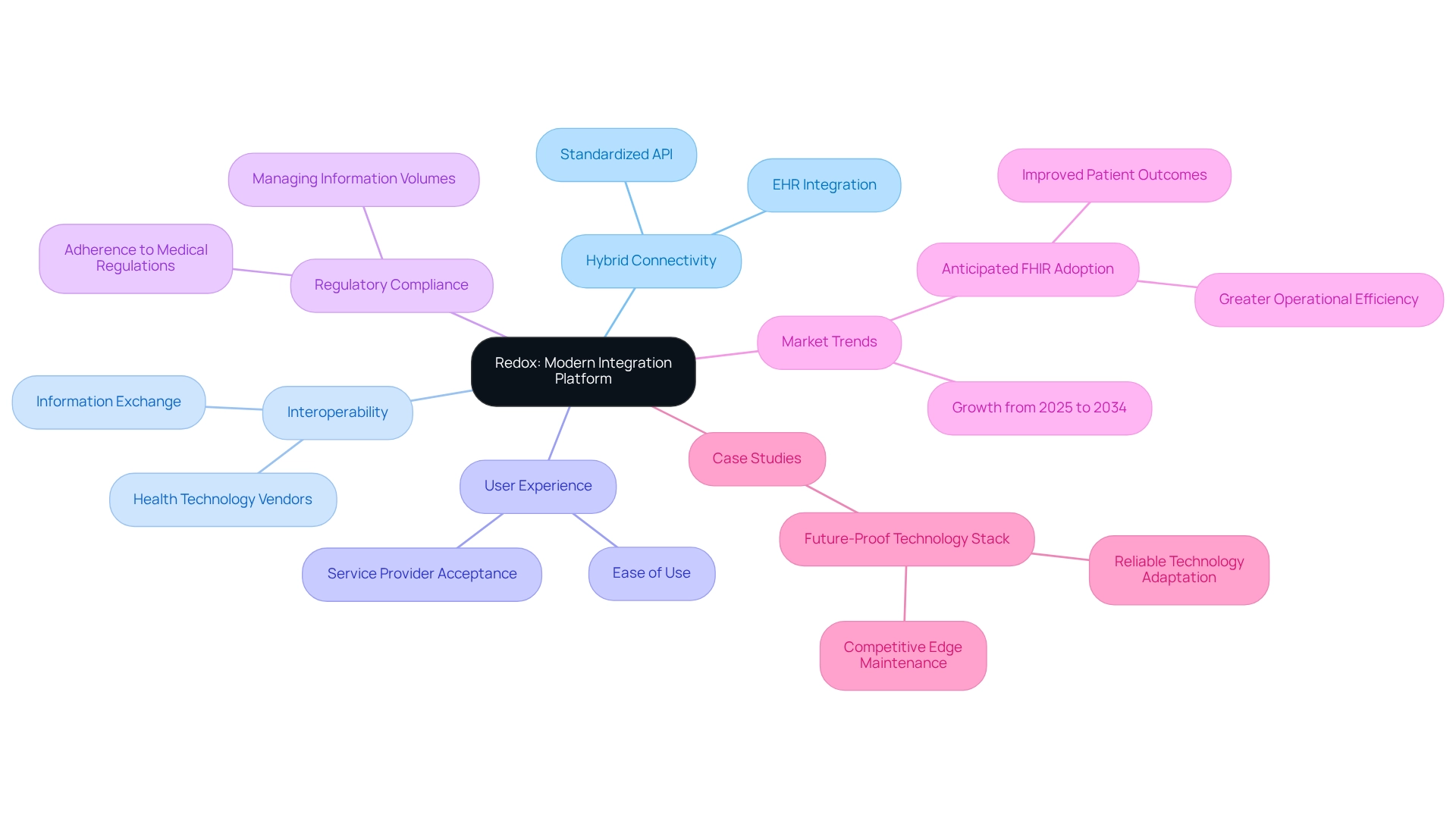
Corepoint Integration Engine: User-Friendly HL7 Management
We understand that seamless information exchange is crucial in medical settings. That’s why the Corepoint Integration Engine is skillfully designed to enhance HL7 messaging using HL7 integration tools, empowering healthcare professionals to manage integrations effectively, even without extensive technical expertise. This accessibility allows various staff members to engage with the system confidently.
Furthermore, Corepoint excels in real-time information processing, ensuring that details are current and precise—vital for patient care. Our platform features robust monitoring tools that uphold data integrity and compliance with industry standards. By utilizing HL7 integration tools that promote standardized messaging formats, we enhance interoperability among healthcare providers, ultimately improving patient outcomes. For instance, a recent study conducted with ADHD 360 emphasized how effective incorporation can significantly improve treatment outcomes in virtual ADHD care, showcasing the importance of objective testing enabled by strong incorporation solutions like Corepoint.
In addition, utilizing XSLT within the Corepoint Integration Engine enables efficient XML conversion, significantly decreasing programming mistakes and effort related to connection tasks. This capability is especially advantageous in hybrid connection solutions, where the complexity of data structures can present challenges. Our modular architecture allows for scalability, adapting to the evolving needs of healthcare organizations. This flexibility is crucial as institutions expand and require more advanced connection solutions. User satisfaction statistics from 2025 indicate a high level of approval among Corepoint users, reflecting our effectiveness in simplifying complex connection tasks. Moreover, case studies demonstrate successful applications of Corepoint in various medical environments, including enhancements in patient scheduling systems that improve coordination and decrease wait times through the use of HL7 integration tools for effective messaging management. As Gustavo Estrada pointed out, ‘Avato has the capacity to streamline intricate projects and provide outcomes within preferred timelines and budget limitations,’ highlighting the value we contribute to medical integration.
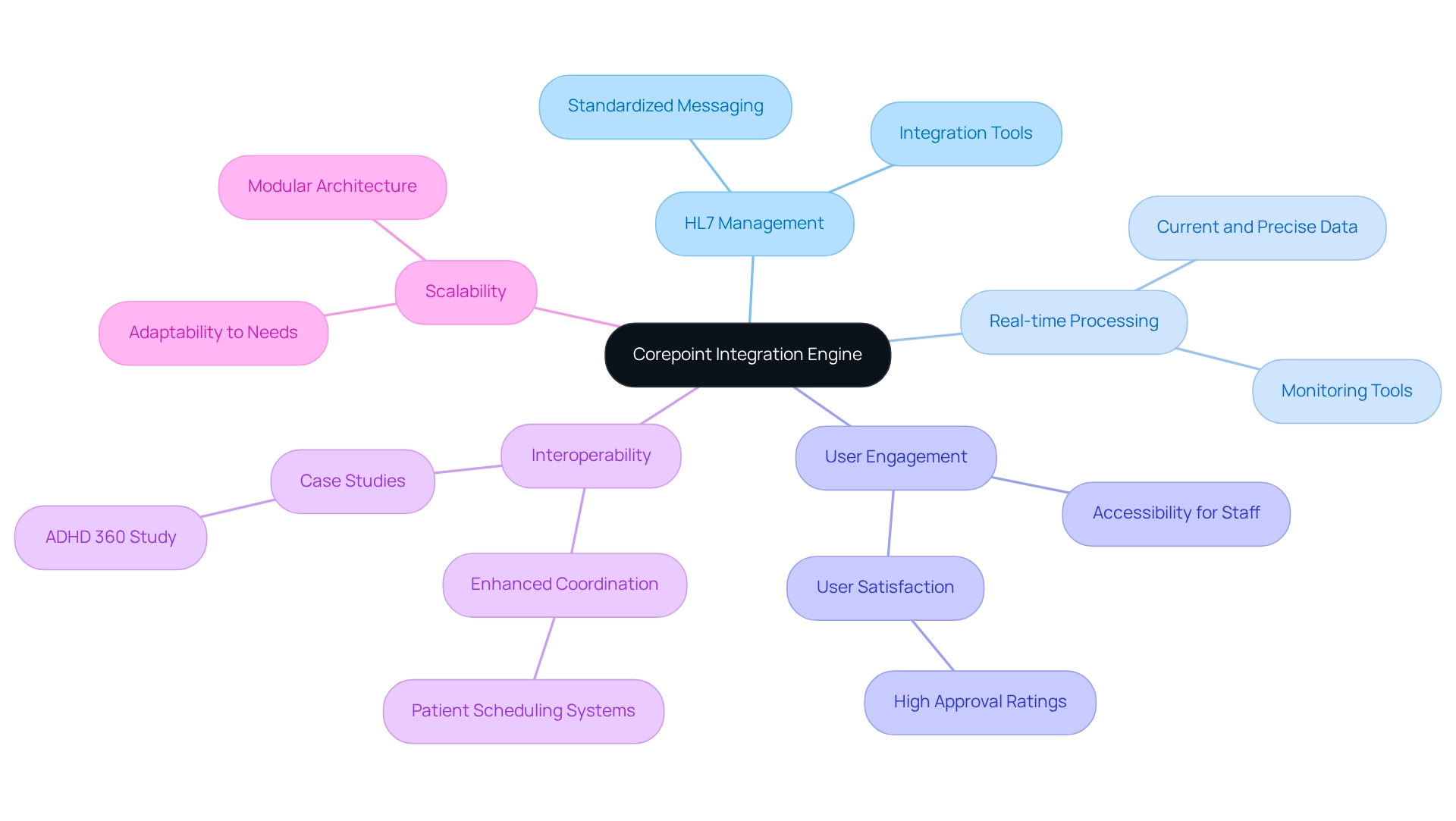
Health Gorilla: Secure Health Data Exchange Platform
We at Health Gorilla stand out as a secure health information exchange platform that facilitates seamless sharing of patient details among medical organizations. As a Qualified Health Information Network (QHIN), we adhere to HIPAA regulations and other compliance standards, ensuring that sensitive information is managed with the utmost security. Our platform supports HL7 messaging and features hl7 integration tools that streamline integration with existing systems, making adoption easier for medical providers. In 2025, the emphasis on HIPAA compliance in health information exchange solutions remains crucial, with Health Gorilla leading the charge in effective patient information sharing. Our commitment to security and patient consent not only enhances care coordination but also protects patient information from breaches. Notably, medical information breaches in the U.S. have declined by 48%, showcasing the success of rigorous compliance measures and the proactive steps we take to safeguard sensitive information.
Our features include robust encryption protocols and real-time monitoring, essential for maintaining a secure environment for information exchange. Expert insights highlight our platform’s role in improving patient care outcomes, as secure information exchange directly influences the quality of care provided. Case studies demonstrate how organizations leveraging Health Gorilla and using hl7 integration tools have adeptly navigated the complexities of health information sharing while remaining compliant with HIPAA, showcasing specific results such as reduced incident response times and enhanced patient trust. As the landscape of medical services evolves, the importance of secure health information exchange platforms like ours, which incorporate hl7 integration tools, cannot be overstated. We not only ensure compliance but also cultivate trust between patients and providers, ultimately leading to improved health outcomes. Furthermore, as Roy Schoenberg noted, the shift in purchasing patterns from health plans to health systems underscores the growing demand for secure information exchange solutions. Additionally, organizations such as UpGuard play a crucial role in assisting medical entities in managing their security postures and gaining insights into third-party contractors, which is vital for maintaining compliance and protecting sensitive information.
For banking IT managers, understanding the financial implications of secure medical data exchange is imperative, as it directly impacts risk management and operational efficiency within medical organizations.
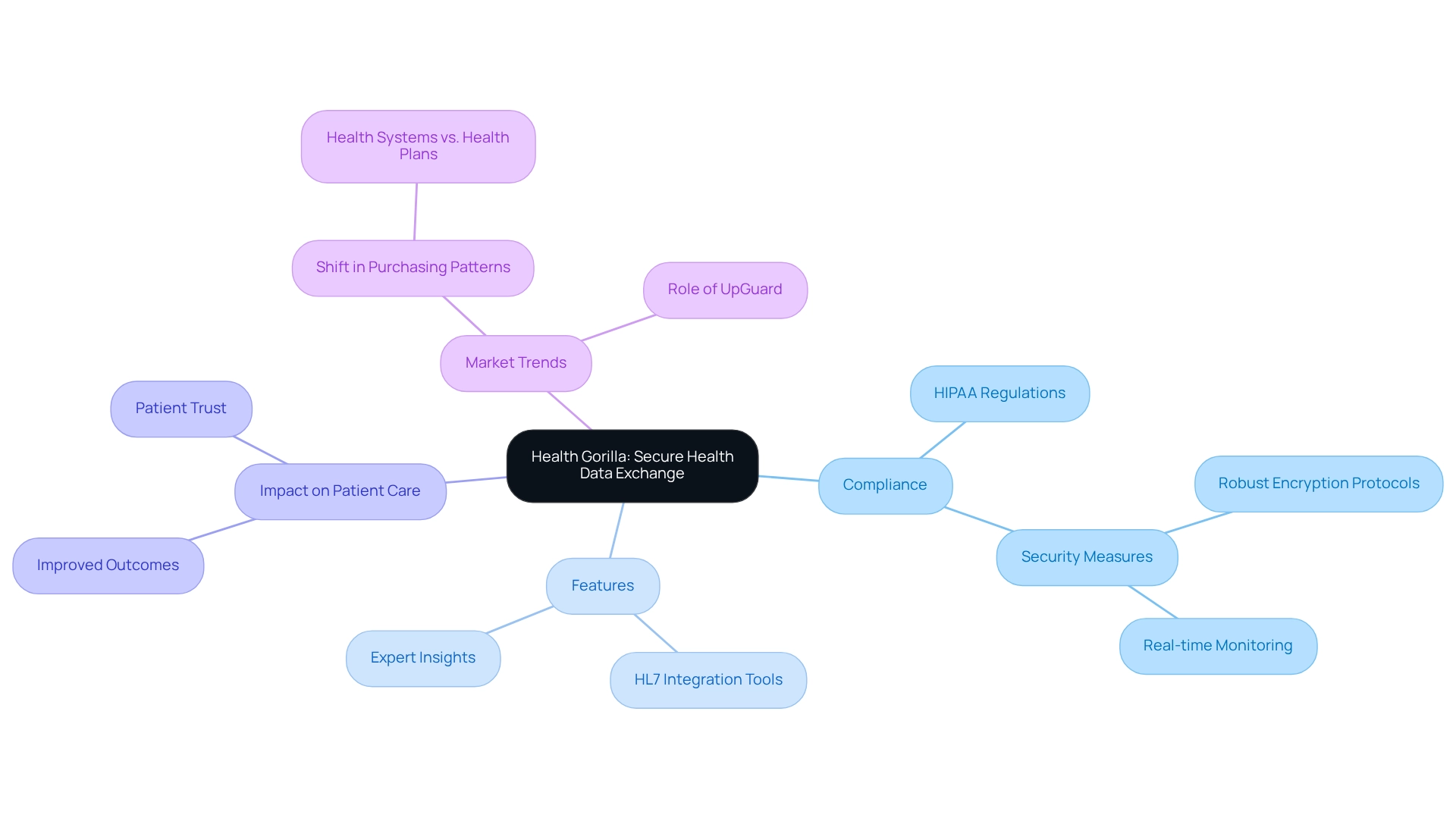
IBM Watson Health: Advanced Analytics for HL7 Integration
Our Hybrid Platform plays a crucial role in enhancing connections through HL7 integration tools within the healthcare and banking industries. By ensuring secure handling of complex systems and delivering 24/7 uptime, we address the critical needs of these sectors. This platform streamlines intricate connections, maximizing the value of legacy systems while considerably lowering expenses.
For banking IT managers seeking efficient and secure unification solutions, this is particularly pertinent. The anticipated expansion of predictive analytics in the medical field is noteworthy, with local startups creating customized solutions that cater to regional needs. This trend is underscored by the fact that venture capital investments in smart medical startups reached $9.8 billion in 2023, reflecting a robust interest in innovative health technologies.
Furthermore, our capabilities are essential in achieving successful medical outcomes, as illustrated by case studies that demonstrate enhanced patient care through data insights. The rise of health-related wearable devices in China, where over 60% of consumers have interacted with such technology, exemplifies the growing trend in health monitoring and highlights the importance of HL7 integration tools.
Lastly, the deployment of AI-driven fraud detection systems, which have reduced fraud in medical services by nearly 40%, highlights the importance of secure connections in the medical field, aligning with the operational efficiency concerns of banking IT managers.
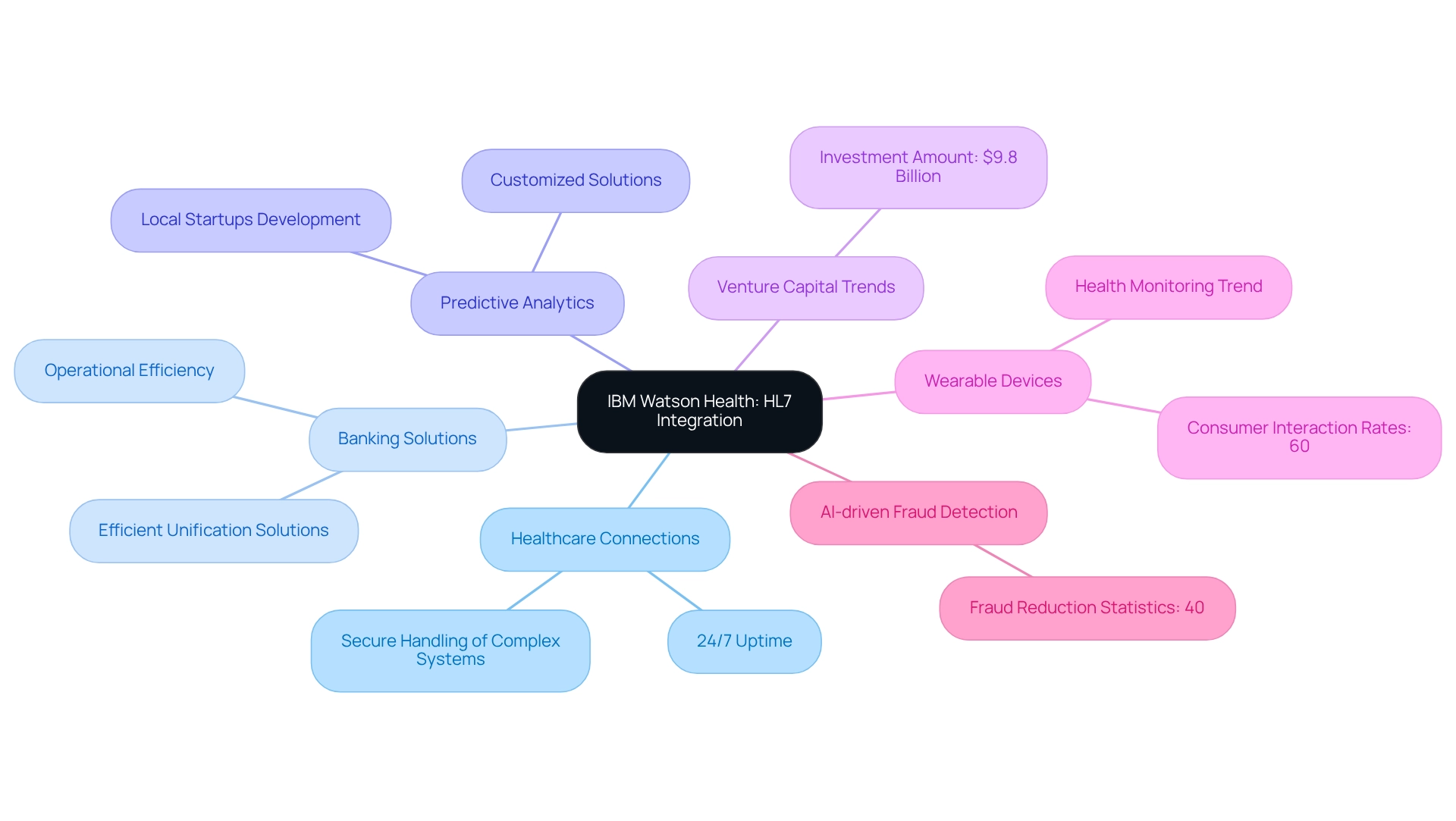
Cloverleaf Integration Suite: Established HL7 Messaging Support
We recognize the Cloverleaf Integration Suite as one of the formidable HL7 integration tools for managing HL7 messaging in medical environments. It adeptly accommodates a wide range of messaging standards and provides comprehensive tools for message routing, transformation, and monitoring. With our user-friendly interface, medical organizations can effortlessly establish connections, facilitating seamless information transfer and enhancing interoperability.
The suite’s effectiveness is underscored by its significant market presence; the medical information unification market is projected to reach $5.52 billion by 2029, growing at a CAGR of 18.1%. This growth signals an increasing demand for reliable connection solutions like Cloverleaf, which has demonstrated successful applications across various medical settings. Notably, BC Platforms’ recent acquisition of Medexprim highlights the industry’s focus on expanding health data networks, reinforcing the necessity for efficient connection tools.
As organizations strive to modernize their operations, Cloverleaf’s established reputation positions it as a trusted choice for enhancing interoperability and ensuring effective messaging in the medical field. Moreover, our hybrid connectivity platform, utilizing HL7 integration tools, plays a pivotal role in simplifying complex connections and empowering organizations to effectively address HL7 interoperability challenges.
Gustavo Estrada emphasized how our platform enabled the alignment of desired outcomes within specified time frames and budgets, underscoring the importance of cohesive solutions in the medical sector. Additionally, Cloverleaf’s strategy for resilience and outage reporting addresses critical concerns for organizations seeking dependable unification solutions, making it a comprehensive option for messaging in the medical field.
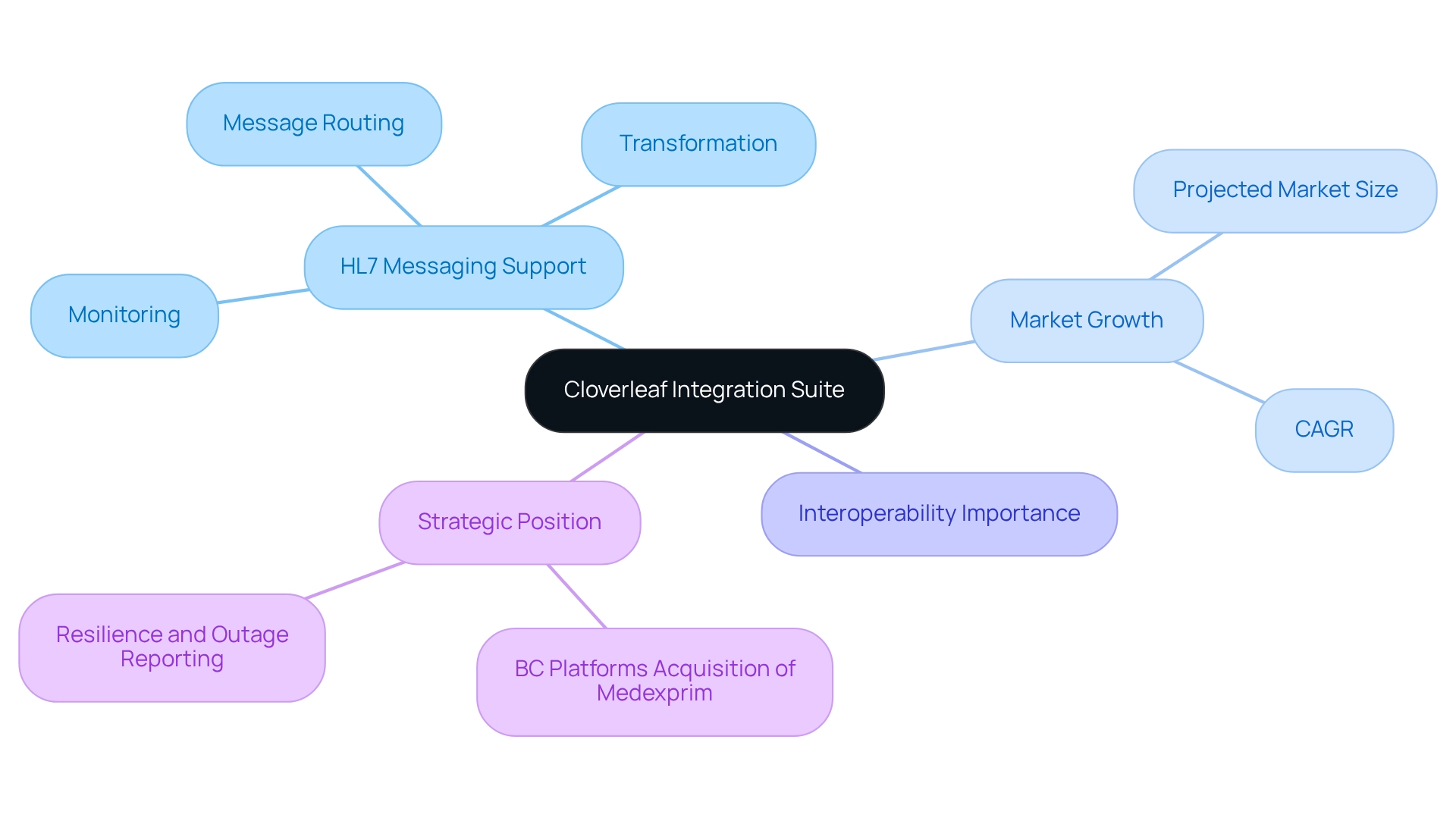
Orion Health: Interoperability Solutions for HL7 Integration
We established our company in 2010 with a clear mission: to offer an extensive range of HL7 integration tools that simplify HL7 connections across medical systems while also addressing the needs of industries such as banking. By supporting various standards, including HL7 v2 and FHIR, our platform leverages HL7 integration tools to enable seamless information exchange between disparate systems, which is crucial for effective care coordination and operational efficiency.
As we look to 2025, we anticipate a considerable rise in adoption rates for our interoperability solutions, reflecting the increasing demand for effective information merging across various sectors, especially with the implementation of HL7 integration tools to significantly enhance care coordination. Studies have demonstrated a notable rise in patient outcomes when medical providers have access to comprehensive and precise patient details. Our commitment to reducing downtime during integration processes is essential for sustaining business continuity, allowing enterprises to maintain operations without major disruptions during digital transformation initiatives.
Furthermore, our recent updates emphasize advancements in data exchange capabilities, ensuring that medical providers can access real-time information—an essential factor for prompt decision-making. Successful case studies, such as our collaboration with financial institutions, illustrate how organizations have effectively applied our solutions to achieve interoperability, leading to increased operational efficiency and improved patient care. For instance, our partnership with Coast Capital showcased a smooth transition with minimal downtime, enhancing the platform’s dependability.
Expert assessments consistently commend us for our strong interoperability solutions, highlighting their role in revolutionizing medical service delivery and financial operations. By utilizing HL7 integration tools, we not only improve care coordination but also empower medical providers and banking IT managers to deliver better results. Join us in transforming the landscape of interoperability; together, we can make a significant impact on contemporary systems.
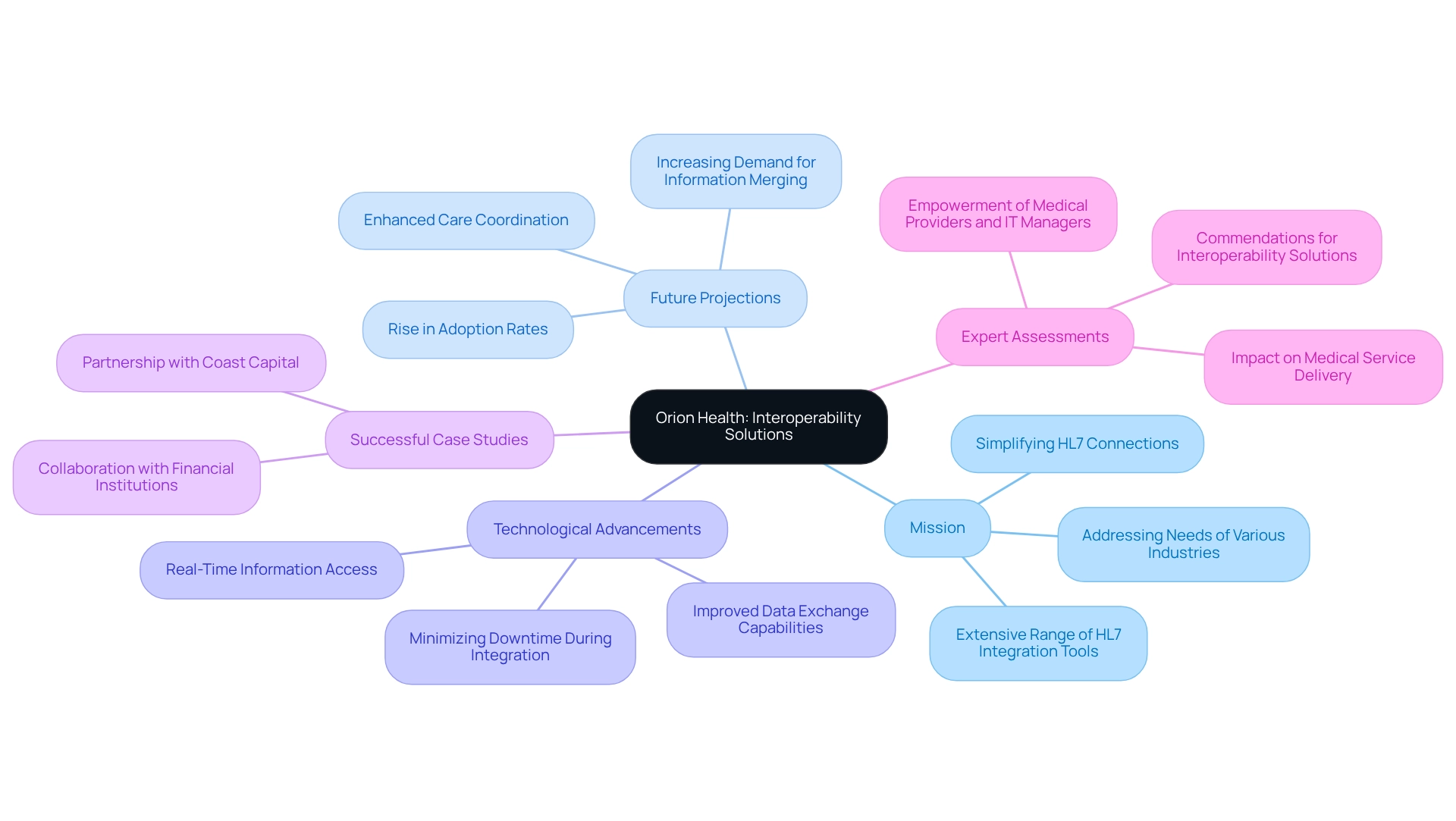
Conclusion: Choosing the Right HL7 Integration Tool
Choosing the appropriate hl7 integration tools is crucial for medical organizations like ours that aim to enhance interoperability and improve patient care. We recognize that key factors to consider include:
- Security: Compliance with HIPAA regulations and robust data protection are essential. Addressing security challenges is vital for successful implementation, especially in the context of big data analytics in healthcare. The right tools can mitigate risks associated with data breaches and compliance issues.
- Ease of Use: A user-friendly interface significantly reduces training time and improves adoption rates among our staff, facilitating smoother assimilation processes and ultimately enhancing patient care. Our hybrid unification platform exemplifies this by streamlining the transformation of unstructured information into structured requirements, making it easier for digital transformation architects to implement effective solutions.
- Scalability: As healthcare organizations grow, our integration needs will evolve. Selecting a scalable solution guarantees that the tool can adjust to growing information volumes and complexity without compromising performance, which is essential for sustaining high-quality patient services. Our platform is designed to future-proof operations, enabling us to scale effortlessly as our requirements evolve.
- Compliance: Adherence to industry standards is vital for maintaining regulatory compliance and ensuring seamless data exchange across systems, which directly impacts patient safety and care quality. Our commitment to compliance ensures that our solutions meet the stringent requirements of regulated industries.
Statistics show that successful EHR implementation can decrease the time needed to obtain patient information by as much as 80%, highlighting how essential the selection of a connectivity tool is for enhancing patient care results. Moreover, the increase in specialty-specific EHR adoption rates, especially in areas such as dermatology and cardiology, emphasizes the need for customized solutions that address the distinct requirements of various medical sectors.
In 2025, we must prioritize security and scalability when choosing hl7 integration tools. Expert opinions emphasize that adaptability is key; as Charles Darwin noted, “It is not the strongest of the species that survives, nor the most intelligent, but the one most responsive to change.” This principle pertains directly to our field, where the capacity to adjust to new technologies and collaboration challenges can greatly affect patient care and operational efficiency.
Successful evaluations of unification tools in medical organizations demonstrate that a strategic method for selection can result in enhanced outcomes and more efficient operations. By carefully assessing these factors, we can ensure we select the appropriate hl7 integration tools to meet our unique needs and enhance overall service delivery.
Get your copy now to learn more about how we are leading the way in pioneering hybrid integration solutions.
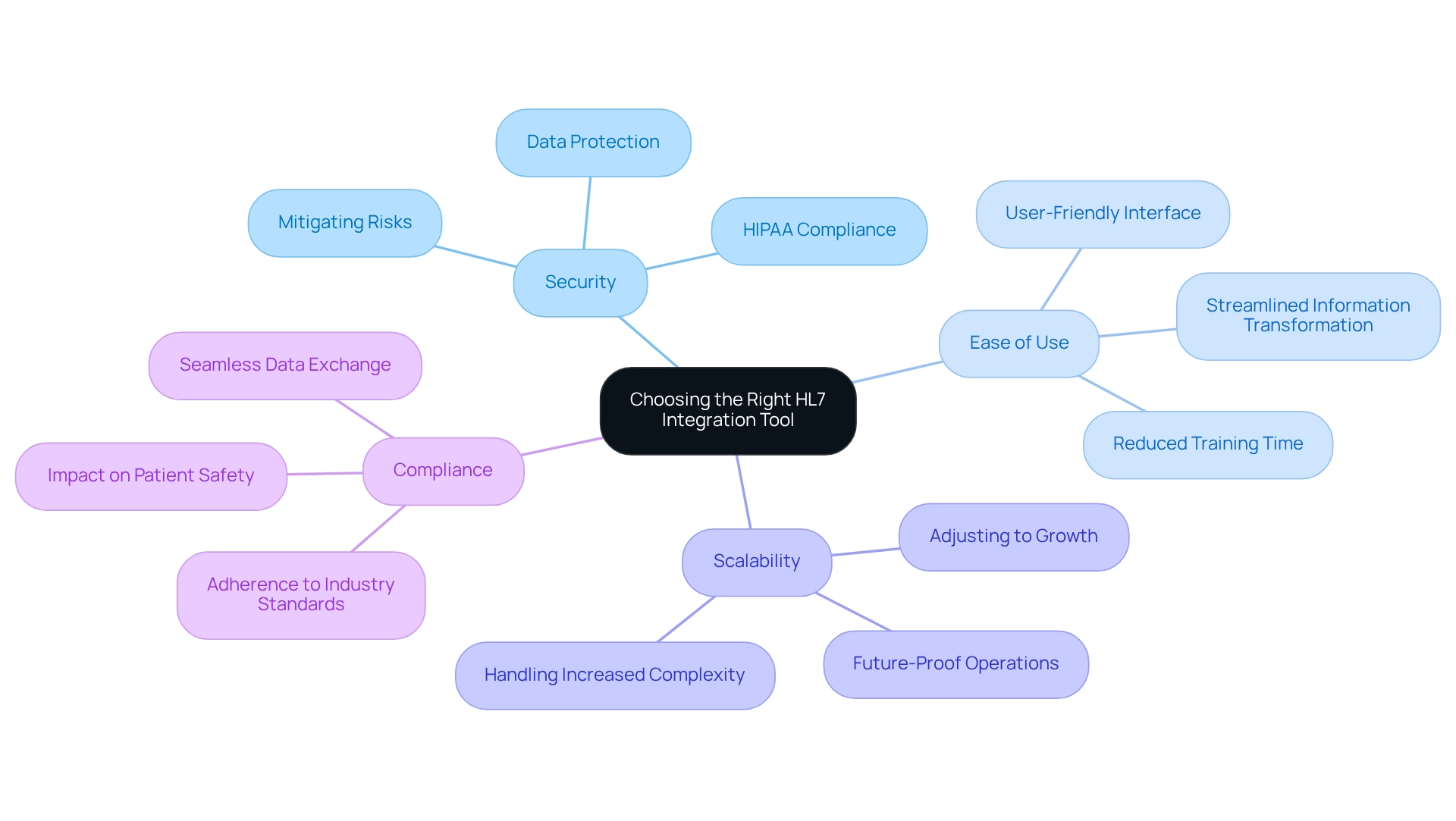
Conclusion
Selecting the appropriate HL7 integration tool is not just important; it is essential for healthcare organizations committed to improving interoperability and enhancing patient care. We must consider several critical factors, including security, ease of use, scalability, and compliance. In an era where data breaches pose significant challenges, ensuring robust data protection and adherence to HIPAA regulations is paramount.
User-friendly interfaces can dramatically reduce training time and foster smoother integration processes, ultimately benefiting patient care. Avato’s hybrid integration platform exemplifies such user-centric design, making it easier for organizations to adapt to digital transformation needs. Furthermore, scalability is crucial for accommodating the evolving demands of growing healthcare organizations, ensuring that integration tools can handle increased data volumes without sacrificing performance.
We highlight the importance of compliance with industry standards, as this directly impacts patient safety and care quality. Effective EHR implementations can significantly decrease the time required to access patient information, indicating that the right integration tool can enhance patient outcomes.
As the healthcare landscape continues to evolve, we must prioritize security and scalability when choosing HL7 integration tools. The ability to adapt to new technologies and integration challenges is vital for improving operational efficiency and patient care. By taking a strategic approach to evaluating these factors, we can select the right integration solutions to meet our unique needs and ultimately enhance service delivery.

